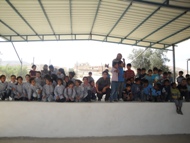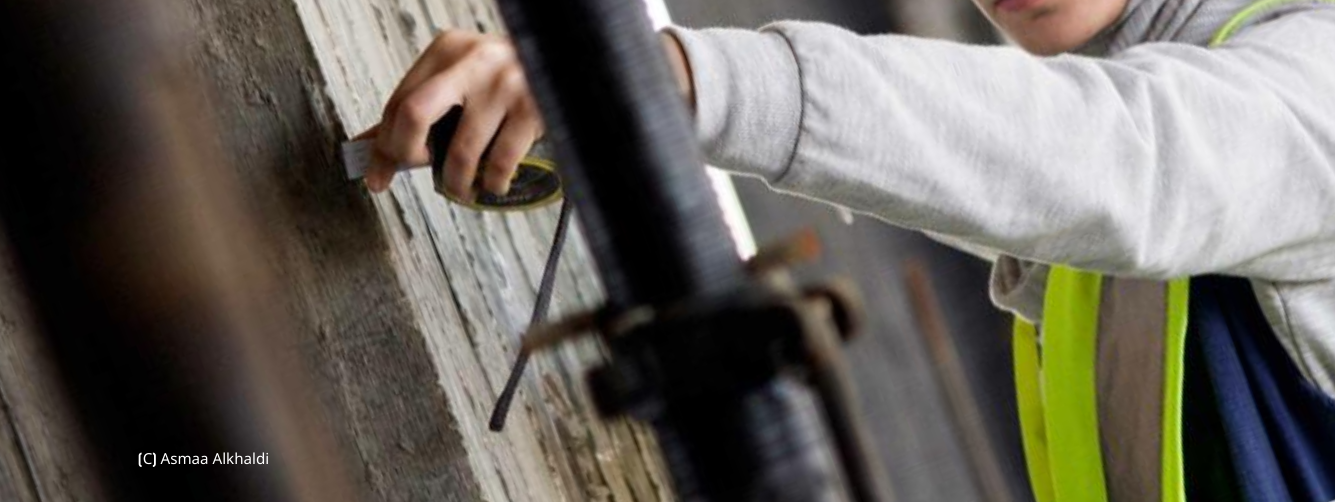
“MIFTAH is head and shoulders above all the other organizations”
As part of MIFTAH’s project “ Fostering community change in the OPT” which is implemented in partnership with OXFAM, Pal vision, the Women’s Studies Center and Ansar, and funded by the EU, MIFTAH built a stage and a roof ceiling at an elementary school in Jiftlik, a village in the Jordan Valley. Through its projects, MIFTAH works to build the capabilities of CBOs and village councils in terms of strategic planning and participatory and good governance. It also aims to raise awareness and information among youth and women on citizens’ rights and active citizenship through participatory methods and understanding the needs of the local community.
Jamal Abu Rihan is a community member of Jiftlik and spoke about MIFTAH’s project in his village.
Can you tell us a bit about yourself and what you do?
I am a Jiftlik resident and a civil servant. I work in the Jericho justice ministry in the attorney general’s office. I am also active in work with the community.
How did you become familiar with MIFTAH?
I really first heard about MIFTAH through the media and also from my wife who was attending training sessions offered by the organization about elected female local council members. My personal journey with MIFTAH began through training sessions and workshops sponsored by the organization within its project, “Fostering Community Change in the OPT”. This project targeted citizens in marginalized villages in the Jordan Valley, which fall within Area C.
What encouraged you to participate in the local community development project?
I felt that this project fulfilled part of the ambitions of my community and also overlaps with my own community interests and activities. So, I was invited to participate.
Tell us about your participation in this project, which was implemented in partnership with local Palestinian organizations and Oxfam
The project began by offering training courses to a group of community activists and NGO members, both men and women and also youth. The courses addressed a number of issues related to participatory governance, planning through participation, citizens’ rights and so on. The courses resulted in the idea of forming a community committee for these areas as a gateway to allow the community in all its sectors – especially the marginalized sectors of women and youth – to participate in the decision making process and to influence decision makers.
We started in October 2010 when we drafted bylaws for this committee upon which it was established. The local community participated through representation from its various sectors and organizations, especially from the women and youth sectors and also the farmers and laborers. Roles were divided according to the bylaw among the members and I was chosen as the coordinator for local community committee for development in Jiftlik.
One of the committee’s activities was to hold a public meeting with the people to determine the needs of the community. One priority was a covered stage to hold meetings, gatherings and elementary school festivals and for the community as a whole.
Given my position as coordinator, I was able to share in the decisions and planning for this project and in preparing the budget. I saw it through until the last minute and I also participated in carrying out a number of activities, including building the stage.
What are some of the activities you carried out within this project and what did you accomplish?
MIFTAH provided the funding for this project through the Jerusalem Fund for Education and Community Development but it was carried out with local efforts and volunteer work from the community. The stage that was built was approximately 50 square meters with an awning.
We also held a number of student meetings in this venue and meetings with parents organized by the youth motivators in the committee. In this meeting, the youth motivators talked about their experience and introduced the community to their activities.
How much has the community benefited from this stage and awning?
Foremost, the project targets elementary school children, who number around 900 students so they can carry out their various activities there. Our school and community was lacking such a place.
In addition to this, it is a place open to all the organizations’ organizations, including the village council, the cooperative and charitable societies’, the women’s centers and the village club. Also, the community committee holds periodic meetings with the people there.
How has the school and the community responded to the project?
Because this project was a response to a certain need in the community and education sector, they showed a great amount of appreciation for its completion. Before, the school would hold its activities under the hot sun and without a stage, which was not the ideal situation. The school administration, its staff and students along with the community as a whole was very grateful for the project.
Do you feel your participation with MIFTAH has helped you to develop your skills and knowledge?
Yes, I feel my participation with MIFTAH has improved my skills and has broadened my knowledge in a number of fields including community development.
Has MIFTAH opened new doors of opportunity for you?
Yes, I feel it has opened doors for me and my coworkers in the field of community development; I would be more than happy to participate in the organization’s future projects as well.
How would you assess MIFTAH from among other similar institutions?
I think MIFTAH has played a pioneer role in targeting local communities and is head and shoulders above all the rest.
What do you think is the impact of such initiatives on society?
They actually have a huge impact. In our community the project led to an increase in the role and participation of marginalized sectors, especially women and youth, in the decision making process. These initiatives also contribute to the move towards building a solid civil society.






